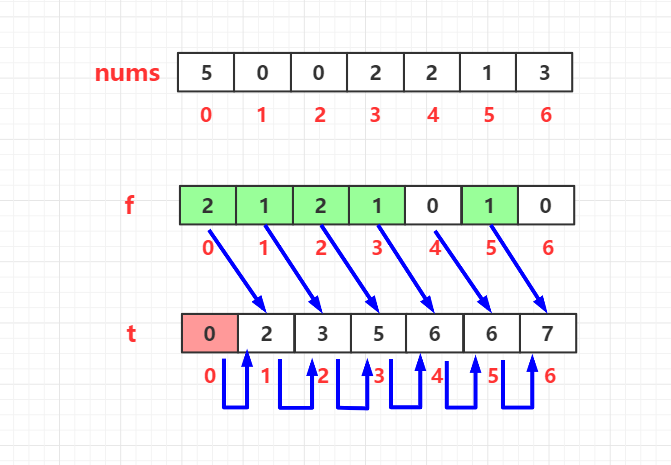题目描述
Given the array nums, for each nums[i] find out how many numbers in the array are smaller than it.
That is, for each nums[i] you have to count the number of valid j’s such that j != i and nums[j] < nums[i].
给你一个数组,分别求出小于当前值的总数。
举个例子:
Input: nums = [8,1,2,2,3]
Output: [4,0,1,1,3]
Explanation:
For nums[0]=8 there exist four smaller numbers than it (1, 2, 2 and 3).
For nums[1]=1 does not exist any smaller number than it.
For nums[2]=2 there exist one smaller number than it (1).
For nums[3]=2 there exist one smaller number than it (1).
For nums[4]=3 there exist three smaller numbers than it (1, 2 and 2).
有如下两个限制:
2 <= nums.length <= 500
0 <= nums[i] <= 100
Update at 2020_0726
这道题还是很有意思的,重新来梳理一下:
先来看下示意图:

首先,我们遍历原始数组,然后使用数组f统计每个元素出现的次数。
然后,用错位累加法统计小于当前值的数量,并记于数组t中。
最后,再次遍历原始数组,从数组t中获取相应值即可。
时空复杂度均为O(n)
强调两个小细节:
第一,因为0 <= nums[i] <= 100,所以为了便于处理边界问题,直接创建的辅助数组长度为110。
第二,数组t中索引为0时需要特殊处理,赋0即可,在nums[i]范围内,不可能有元素小于0。
再来看下完整实现:
class Solution {
public int[] smallerNumbersThanCurrent(int[] nums) {
int N = 110;
int n = nums.length;
int[] f = new int[N];
int[] t = new int[N];
int[] ans = new int[n];
// 1. 统计每个元素出现的次数
for (int i: nums){
f[i]++;
}
// 2. 错位累加
for (int i = 1; i < N; i++){
t[i] = t[i - 1] + f[i - 1];
}
t[0] = 0;
// 3. 获取小于当前值的元素的数量。
for (int i = 0; i < n; i++){
ans[i] = t[nums[i]];
}
return ans;
}
}

